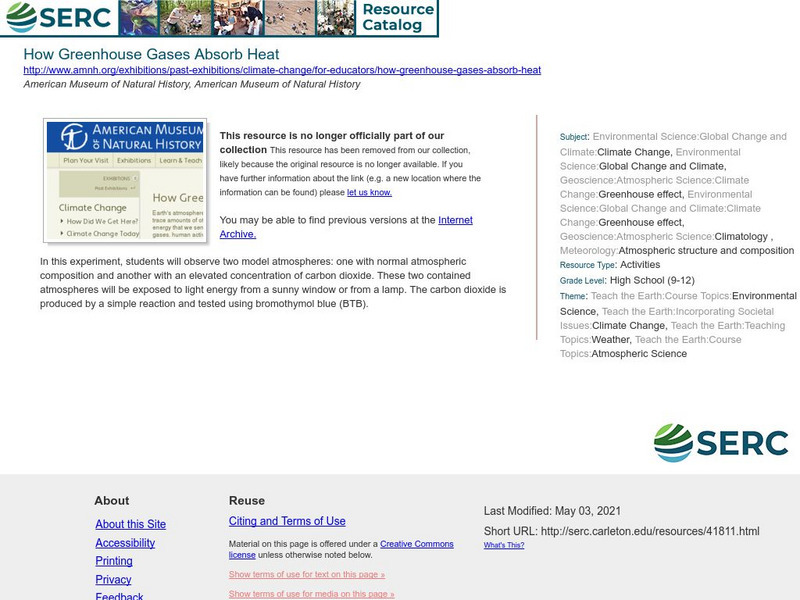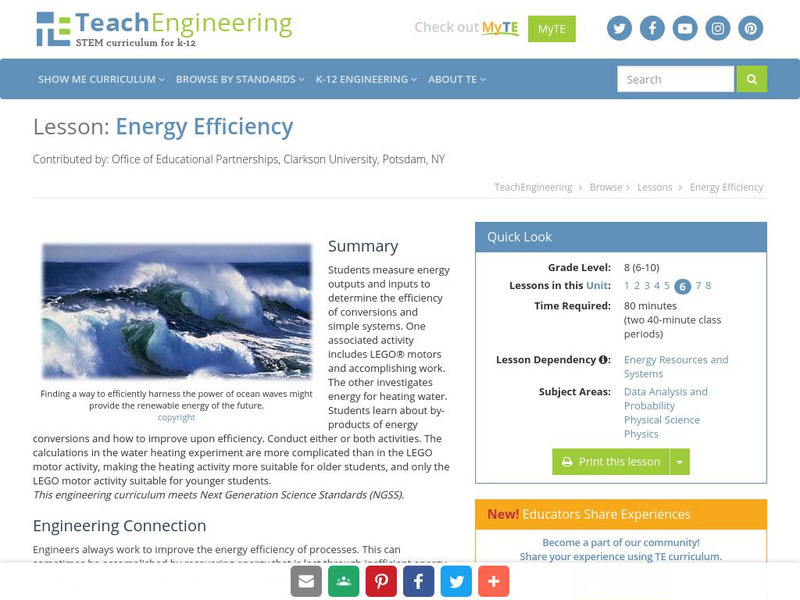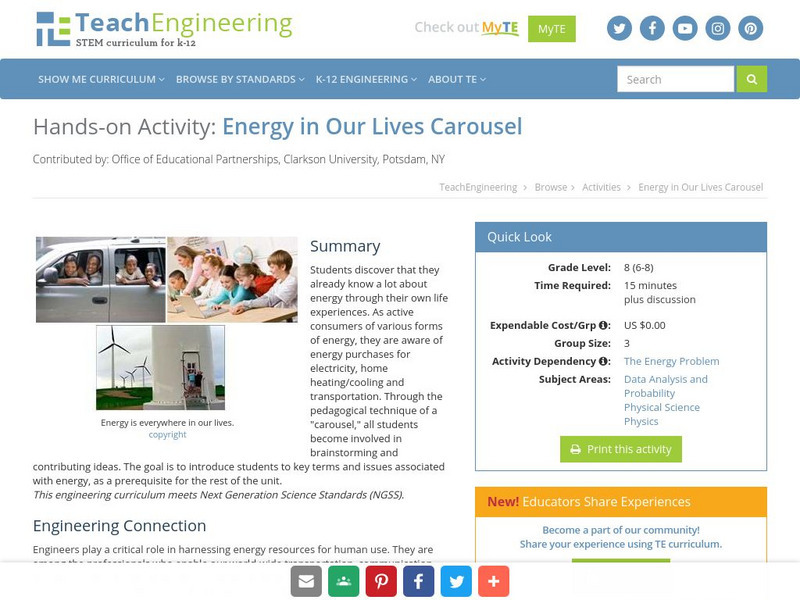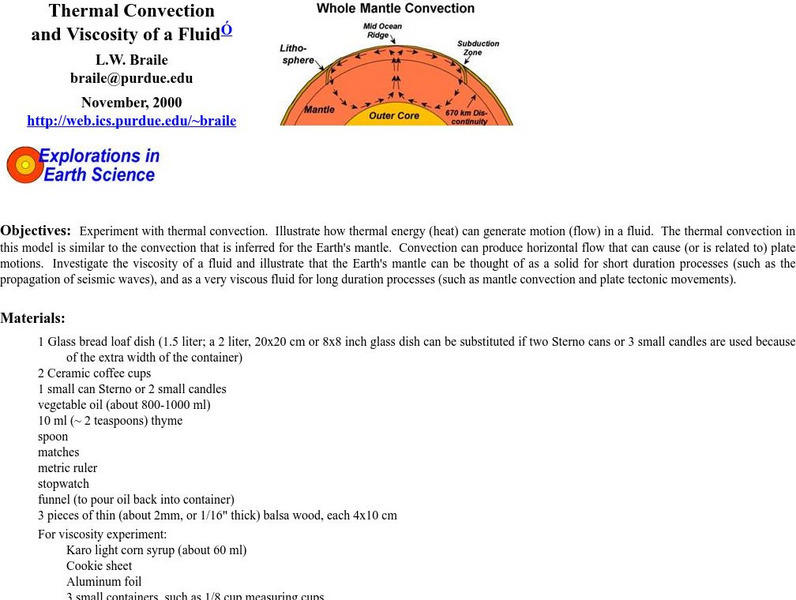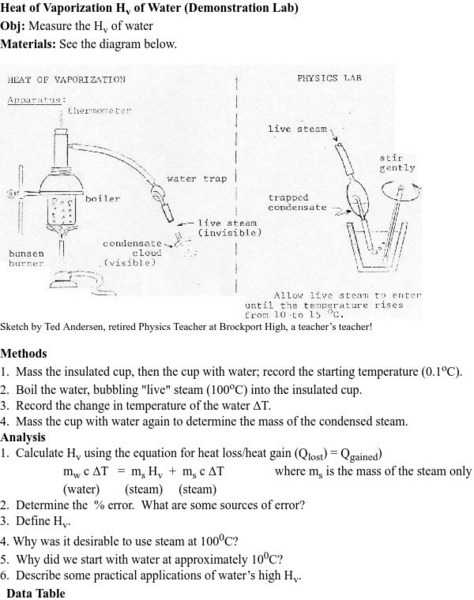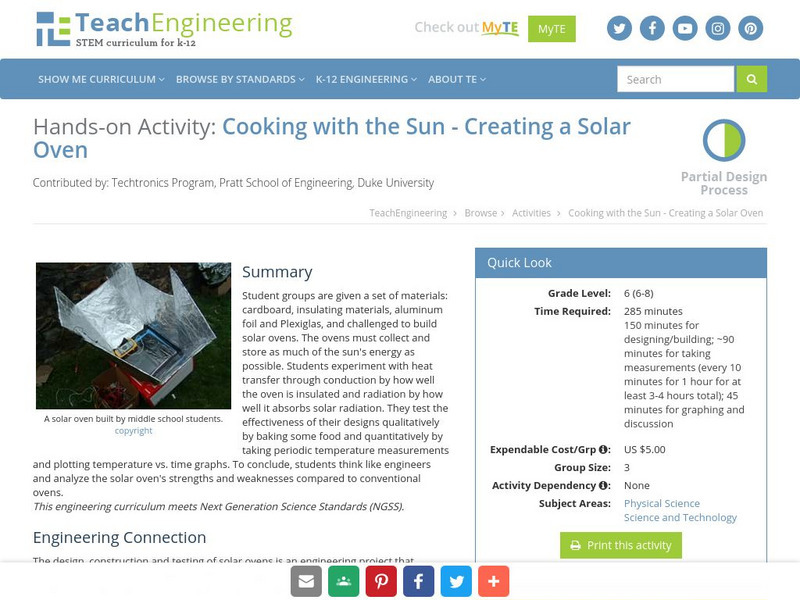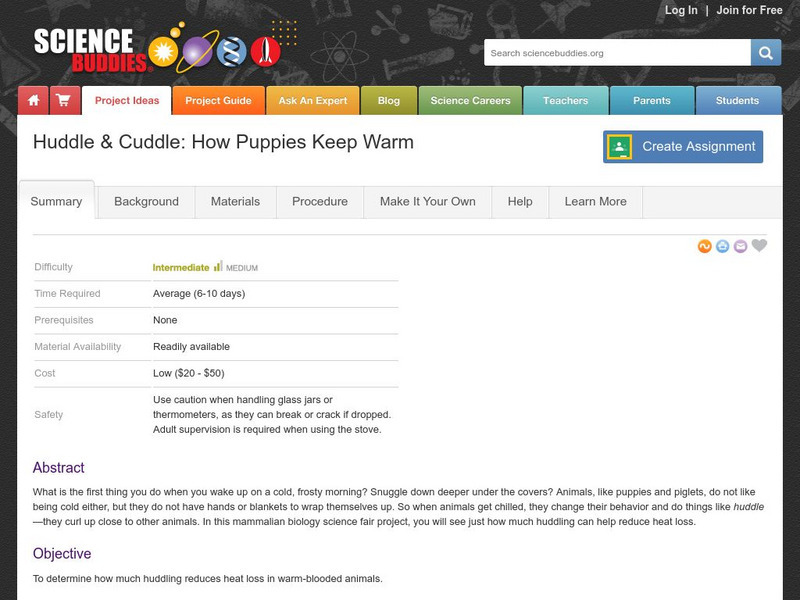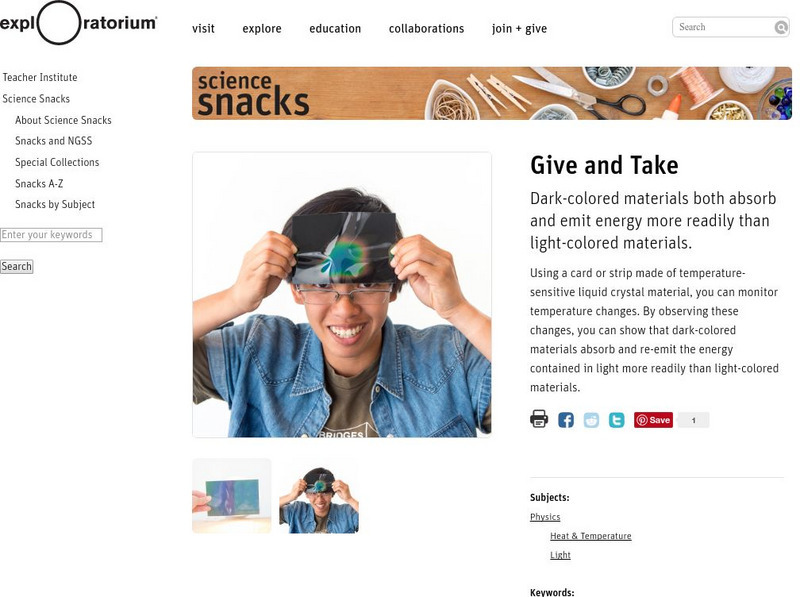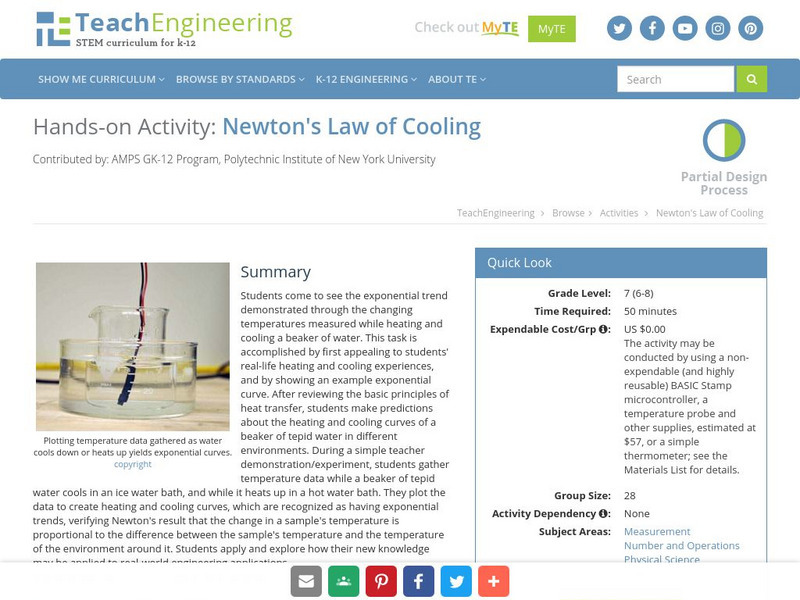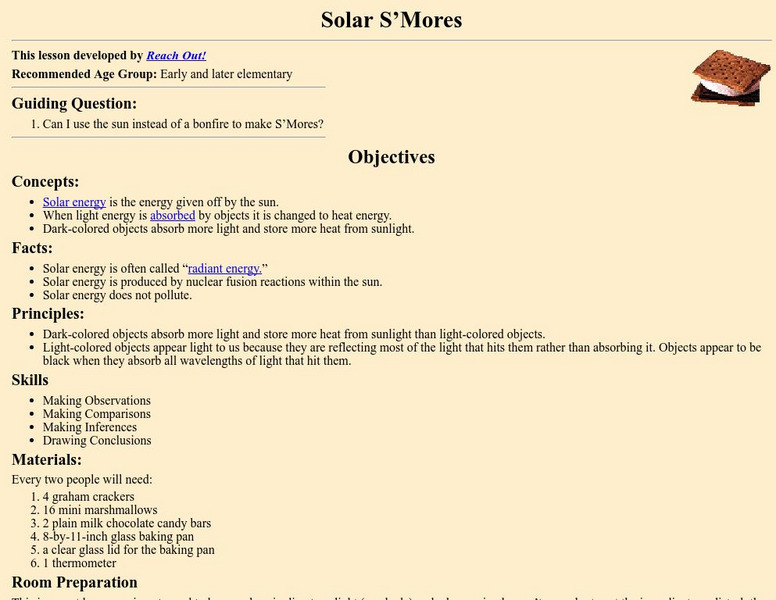Science Education Resource Center at Carleton College
Serc: How Greenhouse Gases Absorb Heat
In this experiment students observe two model atmospheres: one with normal atmospheric composition and another with an elevated concentration of CO2. These two contained atmospheres will be exposed to light energy in a sunny window or...
Science is Fun
Science Is Fun: Rubber Bands and Heat
An experiment to investigate the thermal properties of rubber by studying its behavior in different scenarios. A discussion of how entropy explains what is observed is provided.
TeachEngineering
Teach Engineering: Energy Efficiency
Learners measure energy outputs and inputs to determine the efficiency of conversions and simple systems. One associated activitiy includes Lego motors and accomplishing work. The other investigates energy for heating water. Students...
TeachEngineering
Teach Engineering: Energy in Our Lives Carousel
This activity is a way for students to discover that they already know a lot about energy through their own life experiences. As active consumers of various forms of energy, they are aware of energy purchases for electricity, home...
Science Buddies
Science Buddies: Burning Biofuels: Comparing Nonrenewable and Renewable Fuels
Will using agrofuel offer a substantial alternative to using fossil fuel? With this experiment you can compare the amount of heat energy released by agrofuel and fossil fuel. The Science Buddies project ideas are set up consistently...
Purdue University
Purdue University: Thermal Convection
Students build a model representing the properties of Earth's mantle, illustrating how thermal energy creates movement in a fluid.
Other
Physics Labs: Heat of Fusion (Hf) of Ice
A complete set of directions, notes and suggestions for a lab involving the determination of the heat of fusion of ice. Suitable for a student project or lab investigation.
Other
Physics Labs/heat of Vaporization (Hv) of Water
A complete set of directions, notes and suggestions for a demonstration involving the determination of the heat of vaporization of water. Suitable for a student project or lab investigation.
Other
Physics Labs/specific Heat (C) of Metal
A complete set of directions, notes, and suggestions for a lab involving the determination of the specific heat values for various metals. Suitable for a student project or lab investigation.
Carnegie Mellon University
Chem Collective: Meals Ready to Eat
While camping on the Appalachian Trail, a storm dampens all the fire wood and you must design a chemical reaction to heat your meal. In this activity, students design an experiment in the virtual lab to determine the heat of reaction for...
TeachEngineering
Teach Engineering: Cooking With the Sun Creating a Solar Oven
For this activity, students will be given a set of materials: cardboard, a set of insulating materials (i.e. foam, newspaper, etc.), aluminum foil, and Plexiglas. Students will then become engineers in building a solar oven from the...
Science Buddies
Science Buddies: Project Ideas: Huddle and Cuddle: How Puppies Keep Warm
In this mammalian biology science fair project, students will determine how much huddling reduces heat loss in warm-blooded animals. The Science Buddies project ideas are set up consistently beginning with an abstract, objective, and...
Science Buddies
Science Buddies: Project Ideas: How Horses Keep Warm in the Wind
In this mammalian biology science fair project, students will learn about methods of heat transfer and determine the best direction in which horses should stand in a cold wind to maintain their core temperature. The Science Buddies...
National High Magnetic Field Laboratory
Magnet Academy: James Joule
James Prescott Joule experimented with engines, electricity and heat throughout his life. Joule's findings resulted in his development of the mechanical theory of heat and Joule's law, which quantitatively describes the rate at which...
Science Education Resource Center at Carleton College
Serc: Why Is the Earth Still Hot Inside?
In this lesson, students conduct heat transfer experiments to investigate why the Earth is still hot at its core, even after billions of years since its formation. They will learn that the rate of heat transfer is dependent on an...
Science is Fun
Science Is Fun: The Fireproof Balloon
In this experiment, two balloons are each placed over a lighted match, but the one that has had water placed inside it does not burst. Includes an explanation of why that is so.
Museum of Science
The Atoms Family
Let this classic family of monsters guide you as you learn about energy. Interactive exercises, experiments, and demonstrations help to build knowledge and raise questions.
Museum of Science
Museum of Science and Industry: Online Science: Get the Porridge Just Right
Step-by-step illustrated instructions for an experiment investigating the loss of heat in three bowls of porridge.
Exploratorium
Exploratorium: Science Snacks: Give and Take
An activity for students to explore how dark-colored materials absorb and emit more energy vs. light-colored material.
Bill Nye
Bill Nye: Burn Rubber
This tutorial from Bill Nye explains how to perform a simple experiment with a rubber band. The experiment demonstrates how friction can dissipate energy as heat.
Science Fun for Everyone
Science Fun: Polar Bear Blubber
How can polar bears live in such cold climates? In this experiment, you will make your own blubber to understand how polar bears stay warm.
TeachEngineering
Teach Engineering: Newton's Law of Cooling
Middle schoolers come to see the exponential trend demonstrated through the changing temperatures measured while heating and cooling a beaker of water. This task is accomplished by first appealing to students' real-life heating and...
Science Buddies
Science Buddies: A Matter of Degrees: Tilt of Earth's Axis Affects the Seasons
In this science fair project, use a globe and a heat lamp to investigate how the angle of the Sun affects global warming. This project includes the objective, background questions, a list of all the materials you'll need, and the...
Michigan Reach Out
Solar S'mores
Students can make s'mores without using a bonfire. This experiment is great to use with the links "Materials that Absorb Solar Energy" and "A Solar Heat Experiment."


